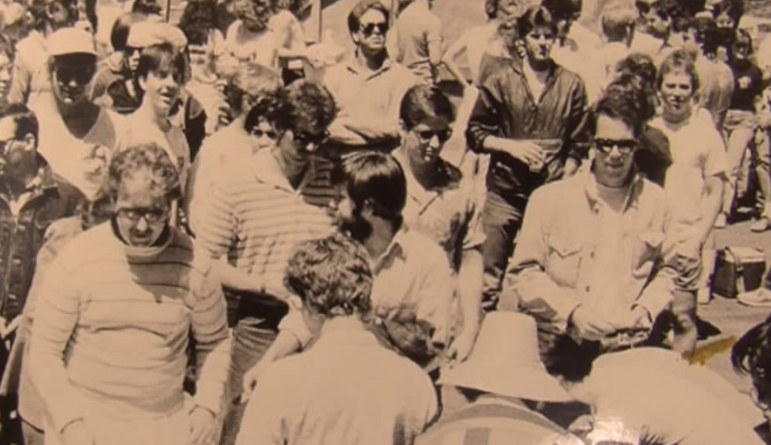As most UW students undoubtedly know, the 2013 Mifflin Street Block Party was anything but the raucous booze fest of recent years past, encouraged in large part by local intervention as well as competing against a safer, student-led alternative event. It’s easy to reduce the annual party to a mass of sweaty, heavily-intoxicated college students, but Mifflin has a storied past that remains an important piece of Madison’s local history.
The documentary short The First Saturday in May, directed by UW journalism students Matt Oleson and Molly Reich, provides a Cliff’s Notes history of the block party, from its early origins as a street protest and ensuing police encounters to the Mifflin Co-Op’s sponsorship and the 1996 riots. Of course Oleson and Reich also tackle the escalation of the notorious 2011 event, which saw two stabbing incidents, rampant intoxication and an increase in arrests.
The short’s production quality is admittedly uneven. Its edits are rough, the sound mixing is lackluster, and much of the archival footage — in part provided by the Wisconsin Historical Society — gets a less than stellar presentation. Despite its aesthetic shortcomings, the student project makes for a worthwhile ten minutes. Oleson and Reich track down a pair of UW alumni who attended the block party during its formative years, lamenting the Madison Police Department’s aggressive tactics while struggling to recall whether the Mifflin Co-Op actually baked “magic” brownies for attendees.
In addition, Mayor Paul Soglin and District 4 Alder Mike Verveer provide a politically-oriented focus to their reminiscences, and it’s largely through their perspectives that The First Saturday in May questions the block party’s place in Madison. Both Soglin and Verveer make no qualms about the event’s troubling increases in violence and out-of-state attendees, especially given its past as a homegrown party by and for Madison’s own.
This past year, the Mifflin Street Block Party saw an active effort from city officials as well as the Madison Police Department to discourage attendees through increased police presence, stricter intoxication penalties, and most notably, the student-organized alternative music festival, “Revelry” at UW’s Union South. Drawing over 3,000 students, the event was deemed a success by its executive director, Sarah Mathews, who also makes an appearance in film. Mathews maintains that Revelry was never meant to be an “anti-Mifflin event” but makes no attempt to hide her “disappointment” in the Block Party’s rowdy aspects.
Despite its production value, The First Saturday in May avoids drowning in the fevered debates and stupefied bacchanalia of Mifflins past. Oleson and Reich present a broad history of the block party’s cultural impact and significance while never shying away from questioning its place in contemporary Madison culture. As the images from this year’s rainy and much quieter event suggest, the annual Mifflin Street Block Party has had an important place in Madison. The First Saturday in May asks whether it’s still an essential one.

